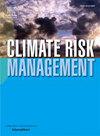Identifying summer energy poverty and public health risks in a temperate climate
IF 5
2区 环境科学与生态学
Q1 ENVIRONMENTAL SCIENCES
引用次数: 0
Abstract
Understanding the health risks associated with indoor overheating and the impacts of cooling energy poverty during summer is becoming increasingly urgent as anthropogenic climate change intensifies heatwave events in many places. We report on results from a cross-sectional postal survey undertaken in Summer 2021/2022, conducted in five regions of New Zealand that typically experience some of the highest temperatures nationally. The study revealed that energy poverty is significant issue during summer, with 43% of the respondents identifying cost as a cooling restriction. Indoor overheating commonly affected the health and wellbeing of participants, with 63% reporting adverse health outcomes. Households citing cost as a cooling restriction were significantly more likely to report adverse health outcomes. Renters and indigenous Māori households were disproportionately affected by indoor overheating and the associated health and energy inequities. These findings highlight the growing health risks from indoor heat exposure in warming climatesparticularly in temperate countries like New Zealand, where inhabitants and infrastructure are not adequately prepared to handle heat-related risks. Relying solely on energy-intensive active cooling exacerbates energy poverty and injustice, increasing residential energy demand. Policy interventions should focus on promoting passive, energy-efficient, and sustainable cooling strategies to protect vulnerable populations from heat-related health disparities.
确定夏季能源贫困和温带气候下的公共卫生风险
随着人为气候变化加剧了许多地方的热浪事件,了解与室内过热和夏季制冷能源匮乏相关的健康风险变得越来越紧迫。我们报告了2021/2022年夏季进行的一项横断面邮政调查的结果,该调查在新西兰的五个地区进行,这些地区通常是全国气温最高的地区。研究显示,能源匮乏是夏季的一个重要问题,43%的受访者认为成本是制冷的限制因素。室内过热通常会影响参与者的健康和福祉,63%的人报告了不利的健康结果。将成本作为制冷限制因素的家庭更有可能报告不利的健康后果。租房者和土著Māori家庭不成比例地受到室内过热以及相关的健康和能源不平等的影响。这些发现突出表明,在气候变暖的情况下,室内热暴露对健康的危害越来越大,尤其是在像新西兰这样的温带国家,那里的居民和基础设施没有充分准备好应对与热有关的风险。仅仅依靠能源密集型主动冷却加剧了能源贫困和不公平,增加了住宅能源需求。政策干预应侧重于促进被动、节能和可持续的制冷战略,以保护弱势群体免受与热有关的健康差异的影响。
本文章由计算机程序翻译,如有差异,请以英文原文为准。
求助全文
约1分钟内获得全文
求助全文
来源期刊

Climate Risk Management
Earth and Planetary Sciences-Atmospheric Science
CiteScore
8.20
自引率
4.50%
发文量
76
审稿时长
30 weeks
期刊介绍:
Climate Risk Management publishes original scientific contributions, state-of-the-art reviews and reports of practical experience on the use of knowledge and information regarding the consequences of climate variability and climate change in decision and policy making on climate change responses from the near- to long-term.
The concept of climate risk management refers to activities and methods that are used by individuals, organizations, and institutions to facilitate climate-resilient decision-making. Its objective is to promote sustainable development by maximizing the beneficial impacts of climate change responses and minimizing negative impacts across the full spectrum of geographies and sectors that are potentially affected by the changing climate.
 求助内容:
求助内容: 应助结果提醒方式:
应助结果提醒方式:


